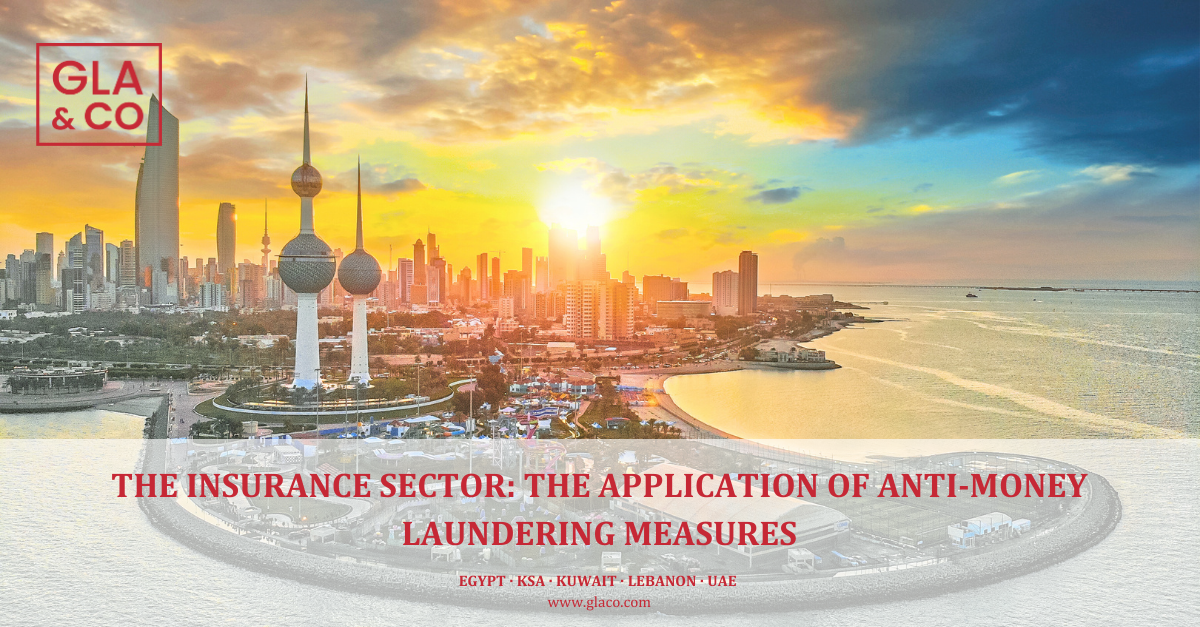
THE INSURANCE SECTOR: THE APPLICATION OF ANTI-MONEY LAUNDERING MEASURES
The Decision issued on 6 November 2023 (the “Decision”) is embedded as part of the scheme to provide protection measures against anti-money laundering and the financing of terrorism in the state of Kuwait, specifically in the insurance sector.
The Decision sets out the obligation to appoint an anti-money laundering officer in any entity functioning in the state of Kuwait and that has to abide by the rules of Law No.125 of year 2019. The Law repeals and replaces the previous Decision No.38 of 2021.
The Decision provides that an Anti-money laundering and fraud Officer (“AMLO”) has to be part of the senior management of the entity and sets out the different obligations of the AMLO under the Decision. The Decision applies to insurance agents, life insurance companies, asset development insurance companies and intermediary insurance agents.
The responsibilities and role of the AMLO
Amongst the key responsibilities of the AMLO is to ensure the application of the policies and procedure related to Law No.106 of 2013 on anti-money laundering and combatting of fraud. It is noteworthy that the insurance intermediary is exempted from appointing an AMLO in the event the intermediary is not providing intermediary insurance services for life insurance activities or money development operations, upon the condition of providing proof of not conducting these insurance services.
The AMLO is responsible of the application and performance of the exact rules for the combatting of terrorism in the insurance sector and must submit a report to senior management.
The responsibility of the AMLO is embedded as well in the action of providing any information and investigating the signs of existence of any anti-money laundering alert or any action that might be suspicious or in violation of the law resulting from dealing with customers.
The AMLO must further ensure being up to date on the United Nations regulations, decisions and security council’s decisions at the Ministry of Foreign Affairs.
Further, part of the AMLO responsibility is to report its opinion or analysis related to any suspicion action that might be considered or listed as anti-money laundering activity or fraudulent action, to the senior management of the insurance entity.
Risk assessment and insurance companies obligations
The assessment is conducted in all aspects that is related specifically to the performance of the works and the identity of the staff members that includes their IDs, whether the staff member is residing in the state or outside of the Kuwaiti jurisdiction.
The life insurance agents, asset development insurance agents, insurance service providers and insurance intermediaries are obliged under the Decision to submit quarterly reports within 15 days from the date of the end of the annual quarter in accordance with the form issued by the director of insurance authority.
The assessment of the Customers and Customers’ Due diligence KYC
The AMLO must comply with the obligation to provide legal and informative measures to be accessed to by the staff within his own entity that he/ she is managing in order to institute any relevant data that might act a prevention against politically suspicious customers or any high risk customers, specifically in the insurance sector.
The risk is assessed based on the following factors’ categories:
- Customers’ related factors;
- Geographical related factors;
- Services’ related factors;
What to ask for in practice?
In general, KYC rules that insurance companies must comply with typically include the following key elements:
- Customer Identification: to verify and document the identity of their customers. This may include obtaining official documents such as passports, national ID cards, or other forms of identification.
- Customer Due Diligence (CDD): to conduct a risk-based assessment of their customers to understand their business activities, sources of funds, and the overall risk associated with the customer. The Decree provides that enhanced due diligence measures may be applied to higher-risk customers.
- Ongoing Monitoring: to monitor customer transactions continuously. Unusual or suspicious transactions should be identified and reported to the appropriate regulatory authorities.
- Record Keeping: Proper record-keeping is usually mandated to ensure that documentation related to customer identification and transactions is maintained for a specified period.
- Politically Exposed Persons (PEP) Screening: to screen customers against lists of politically exposed persons to identify and manage the potential risks associated with such individuals.
Penalties that may be applied on the concerned entities
In full compliance with the provisions of law No.106 for year 2013, it is necessary to apply the following in the event a violation is detected or a breach occurs in any event or under any circumstance:
- Issue written alerts;
- Issue an order to abide by the obligation in accordance with specific procedures;
- Issue an order to submit a full report on the repudiatory measures carried out to remedy the violation;
- Issue an order of application of financial penalty not exceeding 500,000 KWD per violation;
- Suspending the activity of the concerned entity for a period specified by the disciplinary committee;
- Suspending the license;
- Withdrawing the license; or
- Restrict the authorities of the senior management.
Conclusion
Anti-money laundering (AML) regulations are crucial to abide with in the insurance industry. The insurance sector plays a significant role in the global financial system, and it can be susceptible to money laundering activities due to the potential for large transactions, complex structures, and the handling of significant funds. The current framework issued in Kuwait provides significant changes to comply with the increasing rate of fraud in this sector from introducing new obligations, new procedures added in the risk assessment stage and general requirements for compliance.
Authors: Yousef Al Amly, Partner and Rana Mostafa, Associate.
For further information, please contact Alex Saleh (alex.saleh@glaco.com) or Yousef Al Amly ( y.alamly@glaco.com )

